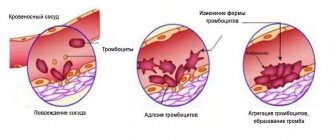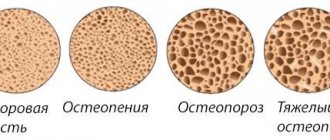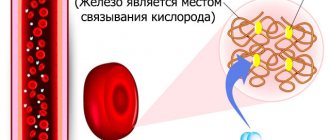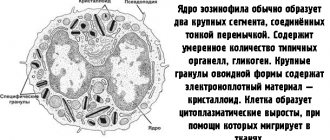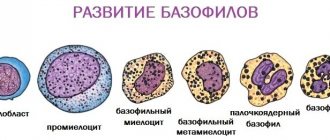Blood biochemistry
07/16/201801/25/2019 Yulia Martynovich (Peshkova) 1392 Views creatinine
In this article we will look at the reasons why creatinine in the blood is low. Creatinine, or a nitrogenous metabolite, is involved in providing muscle tissue with energy. It is the end product of the breakdown of creatine phosphate. Filtered by the glomeruli without reabsorption.
A high level of the substance indicates a decrease in the filtration activity of the kidneys. Low creatinine levels in the blood are a rare phenomenon, but not without diagnostic significance. You should understand the causes and methods of treating this condition.
The study is carried out using the Jaffe kinetic method. The time frame for receiving results is 1-2 days. Cost from 150 rub.
- 1 When is the analysis carried out?
- 2 Creatinine: children’s and adult indicators
- 3 What are the causes of low creatinine in the blood? 3.1 Physiological causes of decreased creatinine levels
What is creatinine?
Creatinine is a molecular structure that is a product of muscle metabolism. The substance is released when protein compounds are destroyed. And the main amount of creatinine is formed in the muscles. Creatinine then travels through the bloodstream to the kidneys, where it is filtered and the substance becomes part of the urine. Almost the entire volume of creatinine is excreted by the kidneys.
The total amount of the substance remains virtually unchanged throughout the day, since a person’s muscle mass does not undergo any significant changes. And if a person experiences deviations in blood creatinine levels (an increase in its amount), then we may be talking about problems with kidney function.
In some cases, on the contrary, a decrease in the content of the substance in the blood is observed. Why does this happen and what does it mean? And this is exactly what we will talk about today.
Creatinine during pregnancy
A serum creatinine test during pregnancy is prescribed to monitor the functioning of the kidneys of a woman carrying a child. But if outside of pregnancy an increased indicator indicates problems with their work, then during gestation it is most often lower.
The normal blood creatinine level for women is 53-97 µmol/l. During pregnancy (most often in the first and second trimester), after a laboratory analysis, a decrease in blood level is diagnosed.
This deviation from the norm is explained by a significant increase in total blood volume. At the same time, the kidneys also work in a more intense mode. A decrease in blood creatinine during pregnancy is a physiological norm. And indicators of 35-70 µmol/l are not a pathology.
Advice! If during pregnancy a woman does not gain weight well, or adheres to a vegetarian menu, then a decrease in the amount of the substance may not be a very good sign. And the expectant mother will be advised to reconsider her diet in order to gain the weight required for her gestational age.
Phytotherapy
Alternative medicine methods have long been used for almost all diseases or conditions of the body. For hypercreatinemia, alternative methods are also used to reduce the level of this substance. Of course, with a pronounced increase, you will definitely have to use medicine, but if the concentration is not too high, it is quite possible to cope with folk remedies.
Herbal tea and decoctions of medicinal plants have a diuretic and, accordingly, cleansing effect, which ensures a decrease in creatinine. Therefore, they are prescribed both as an independent remedy at low magnification, and at significant magnification as an auxiliary therapy to the main medications. Recipes for preparing herbal teas or tinctures are as follows.
Cowberry
Pour 60 grams of plant leaves into a glass of boiling water and leave in a water bath for 30 minutes. Then cool, strain and drink a third of a glass three times a day.
Mint
Pour 2 tablespoons of dry collection into 500 ml of boiling water. Then leave in a thermos for two hours. Once infused, strain and drink throughout the day, adhering to a free regime.
Nettle
The plant is used both dry and fresh. Pour boiling water over 2 tablespoons, cover with a tight lid and wrap in a towel. Let it brew for an hour, strain and take half a glass twice a day.
Sage
A decoction of this plant normalizes creatinine levels very well, but it is better not to use it during pregnancy. When preparing, add 3 tablespoons of dandelion, birch bark and burdock root to 4 tablespoons of sage. Mix the mixture thoroughly and pour 3 tablespoons into one glass of boiling water. Then leave for at least three hours in a thermos, strain and drink 3 tablespoons before bed.
Mint tea is a simple and pleasant way to get rid of creatinemia
Rosehip and pomegranate
Place 1 tablespoon of rose hips and pomegranate peels into a thermos and pour 500 ml of boiling water. Let it brew for half an hour and take throughout the day.
Dandelion root
Chopped root - 1 tablespoon, pour 500 ml of water and leave over low heat until boiling. After simmering for 5 minutes, cover and let cool to room temperature. Strain and drink 60 ml 4 times a day half an hour before meals.
In addition to teas and decoctions of medicinal herbs, the so-called rice breakfast is considered an excellent folk remedy. To prepare it, you need to pour 6 tablespoons of rice overnight, so that the water covers them by a couple of fingers and leave to swell. In the morning, boil the rice without adding salt and eat without adding oil. With regular use, a month is often enough for creatinine levels to become normal.
Initially, it is difficult even for an experienced specialist to say how long it will take to reduce the concentration of creatinine. Everything will depend on the functional abilities of the urinary system, the reasons that caused its increase and the timing of the start of therapy
After all, it’s always easier to get rid of health problems if you pay attention immediately when you detect the very first negative manifestations
Creatinine: children's indicators
The level of creatinine in a child’s blood largely depends on his age, as well as the activity of growth and increase in muscle mass. In newborns, due to the increased load endured by the baby during childbirth, the levels are always high and comparable to the level of creatinine in an adult. The level of creatinine will also be significant in adolescence, which is due to the active growth of the body.
| Age | Norm, µmol/l |
| From birth to two weeks | 55-110 |
| From birth to one year | 50-90 (in this case, the monthly indicator should decrease by 5-10 µmol/l) |
| From 1 year to 14 years | 23-65 |
| At 16 years old | For girls - 50-80 For boys – 60-95 |
The main reason for the decrease in blood creatinine in childhood is a decrease in muscle mass. Creatinine is a byproduct released when muscles contract. That is why, in any disease associated with a significant decrease in muscle mass, a pathological decrease in its indicators is diagnosed.
Reasons for reducing the indicator
Reduced creatinine in the blood is less common than its increased value. You can find out the level of the substance only after taking a biochemical blood test. For the results to be true, the test must be taken in the morning on an empty stomach.
If creatinine in a child’s blood is low, what reasons could cause this condition? First of all, this is a sharp decrease in muscle mass.
This pathological process occurs in the following diseases:
- muscular dystrophy;
- cirrhosis of the liver;
- cardiovascular diseases;
- muscle tissue injury;
- chronic kidney disease;
- infections;
- diabetes.
If creatinine in a child’s blood is low, many reasons can contribute to this. A diet without protein foods can also reduce the substance. For example, vegetarianism or mono-diet. The indicator may also be affected by taking certain medications and hormonal drugs. Often, the loss of muscle tissue is affected by severe nervous shock and stress. Exhaustion occurs due to a lack of energy entering the body, so existing reserves are used, and this is usually muscle tissue.
An elevated creatinine value in children often indicates problems with the kidneys and urinary system. Therefore, it is necessary to find out the cause of this condition and begin treatment for the disease that affected the indications.
Creatinine in the blood of women: why it can be lowered
Creatinine levels in the blood of women depend on age, as well as kidney function.
| Age | Norm, µmol/l |
| Up to 1 month | 27-88 |
| From 1 month to 1 year | 18-35 |
| 1-12 years | 27-62 |
| 12-17 years old | 44-88 |
| Over 17 | 58-96 |
| Over 60 | 53-106 |
Doctors don’t know exactly why the indicators are decreasing. But it is believed that a decrease in the content of this substance in women can be triggered by the following conditions:
- strict adherence to a vegetarian diet;
- lack of weight;
- pregnancy;
- taking glucocortic drugs.
Creatinine in men
The kidneys cannot filter out all the substances that enter them, since the release of creatinine into the blood does not stop for a second. At the same time, the blood plasma of men contains stable levels of the substance, which directly depend on age indicators, characteristics of muscle activity and type of nutrition.
To obtain more accurate indicators when interpreting laboratory tests, it is advisable to follow the following rules:
- Blood sampling should be carried out exclusively in the morning on an empty stomach;
- Before visiting the laboratory, it is recommended to completely abstain from muscular activity, and also avoid overheating or hypothermia;
- one day before sampling, you need to exclude protein-rich foods from your diet;
- At the same time, you should stop drinking coffee or too strong tea.
Creatine levels for men are presented in the table.
| Age | Norm, µmol/l |
| Up to 1 month | 27-88 |
| From 1 month to 1 year | 18-35 |
| 1-12 years | 27-62 |
| 12-17 years old | 44-88 |
| Over 17 | 74-110 |
| Over 60 | 72-127 |
Advice! In men, blood creatinine levels are slightly higher than in women. This is explained by leading a slightly different lifestyle, as well as the difference in the functioning of organs and systems.
Age characteristics also have a great influence on the indicators in men. Many of them regularly visit gyms and take doping agents that enhance the performance of the muscular system.
Common reasons
The reasons for a decrease in the level of the substance in the body in men can be:
- decrease in total muscle mass caused by various diseases;
- while maintaining a low protein diet;
- with severe liver damage;
- with severe renal dysfunction;
- development of a cancerous tumor;
- state of shock;
- poor blood flow to the kidneys;
- blockage of the urinary tract;
- development of heart failure;
- severe dehydration of the body;
- cirrhosis of the liver.
Increased white blood cells and antibiotics
By the way, from what I just wrote, paradoxically, one very important thesis follows.
In case of uncomplicated acute respiratory viral infection (ARVI), there is no need to take a general blood test “just in case.”
You will definitely see lymphocytosis there and will worry where it came from! You will rush to search the Internet for the causes of leukocytosis, you will definitely find horror stories about leukemia there, you will not sleep for two nights, you will make an appointment with a hematologist... And leukocytosis in this case was simply a “witness” of a viral infection. Moreover, it can remain in the blood for up to a month after a cold.
And the second very important idea: leukocytosis is not a disease, but only a symptom of a wide variety of conditions. Hence the conclusion, which is useful to remind not only patients, but also many doctors.
You cannot simply prescribe antibiotic treatment based on the detection of leukocytosis without making a diagnosis and identifying the source of infection.
The fact is that there is no universal “broad-spectrum” antibiotic; For different infectious diseases, completely different drugs and their dosages are used. As a rule, trying to prescribe treatment in a situation where the disease has not been found, but the doctor says: “You have an infection somewhere in your body...” only leads to further diagnostic confusion.
The fact is that pathogens of infectious diseases do not just float in circles in the blood; they always strive to “settle” somewhere, causing a picture of a specific disease. Not to mention the fact that not every fever and not every leukocytosis are signs of a bacterial infection, which, in fact, should be affected by antibiotics.
So, I repeat, with rare exceptions, there is no need to take antibiotics until there is an answer to the question of the name of the disease that we are treating.
Common causes of low creatinine
Low levels of the substance are diagnosed relatively infrequently. The reasons for this deviation may lie in existing pregnancy or age. But there are also quite objective reasons:
- A sharp loss of muscle mass, which is a consequence of the development of muscular dystrophy. Muscle injury is also a danger.
- The reasons for low levels may lie in the development of severe liver diseases, in particular cirrhosis.
- Maintaining a vegetarian diet, strict diets, and complete fasting are also common reasons for a decrease in creatinine levels, since in this case the body stops receiving the protein it needs.
- Heart failure may also be accompanied by decreased readings.
- Sometimes the causes of creatinine deficiency are cancer, as well as infectious diseases, which are characterized by poor blood supply to the kidneys.
- The indicators may also be affected by taking corticosteroid drugs.
- The danger in this regard is also dehydration of the body, as well as a lack of antidiuretic hormone.
Advice! The exact reasons will allow us to establish additional laboratory tests.
Common causes of concentration drops
Reduced creatinine levels are relatively rare and are called hypocreatinemia. This symptom indicates the presence of certain problems with protein metabolism, either throughout the body or in a specific tissue area. Kidney disorders do not have a significant effect on creatinine; the essence of the problem lies not in their work, but in the depletion of protein reserves accumulated by tissues.
A decrease in the content of the metabolite in question is not in itself a disease and does not always require urgent measures. Creatinine can be influenced by many different factors, the set of which, moreover, may be different for women and the stronger sex.
But there are some common reasons:
- following low-protein diets, including vegan/vegetarian;
- fasting treatment;
- exhaustion caused by chronic diseases;
- reduction in muscle mass and volume, which is often observed in people with a sedentary lifestyle;
- long-term treatment with glucocorticosteroids used in the treatment of rheumatism and allergic reactions;
- final stages of cancer pathologies;
- swelling;
- dehydration and the resulting deficiency of antidiuretic hormone;
- infectious lesions accompanied by impaired blood flow in the kidneys.
Other reasons include prolonged adherence to bed rest during the recovery period from illnesses and injuries. Not only physical influences have a lowering effect, but also stress, shock, emotional and psychological stress.
How to Increase Low Creatinine Levels
Measures that can be taken to improve performance depend on the diagnosis. But most often it is recommended to increase muscle mass.
You will also need to give up dieting and begin to include in your diet as many foods as possible that contain the protein the human body lacks. The daily menu in this case should contain:
- meat;
- fish;
- seafood;
- nuts.
It is also recommended to take vitamin-mineral complexes that can restore the deficiency of these substances. If the causes of low creatinine are any diseases, then a course of necessary therapy will be required.
Indications and preparation for analysis
It is necessary to take a creatinine test if you have the following indications:
- persistent hypertension;
- kidney failure;
- states of shock;
- before dialysis.
Metabolite levels are also checked in all patients who are admitted to the intensive care unit and intensive care unit.
Preparation for the study involves the following:
- a couple of days before the procedure, you need to reduce the amount of physical activity; you should not overstrain the body;
- 3 days before the test, reduce protein intake, and the day before the test you can eat no more than 200 g of meat or fish;
- It is prohibited to drink coffee and alcoholic beverages on the day of the procedure;
- Drink enough fluids the day before the test.
If you follow the above recommendations for performing the procedure, the results of the study will be correct. Otherwise, errors may occur.
